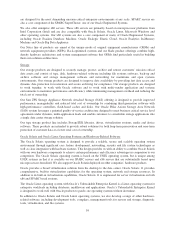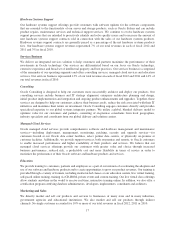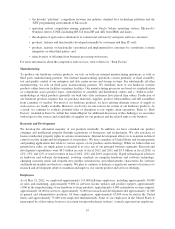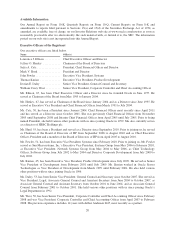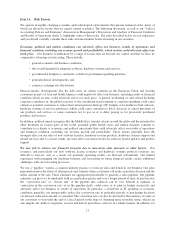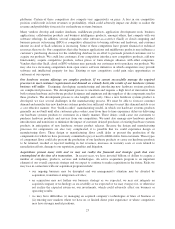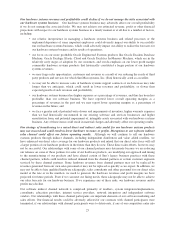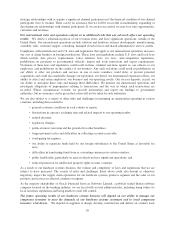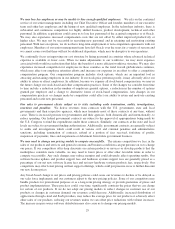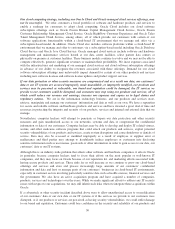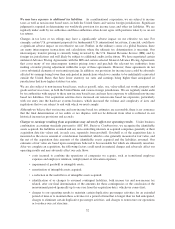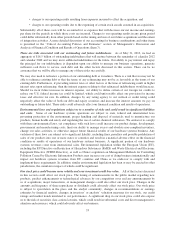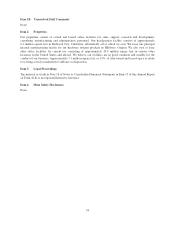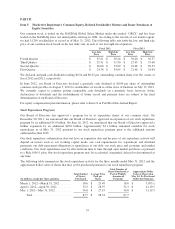Oracle 2012 Annual Report Download - page 30
Download and view the complete annual report
Please find page 30 of the 2012 Oracle annual report below. You can navigate through the pages in the report by either clicking on the pages listed below, or by using the keyword search tool below to find specific information within the annual report.strategic relationships with or acquire a significant channel participant or if the financial condition of our channel
participants were to weaken. There can be no assurance that we will be successful in maintaining, expanding or
developing our relationships with channel participants. If we are not successful, we may lose sales opportunities,
customers and revenues.
Our international sales and operations subject us to additional risks that can adversely affect our operating
results. We derive a substantial portion of our revenues from, and have significant operations, outside of the
United States. Our international operations include software and hardware systems development, manufacturing,
assembly, sales, customer support, consulting, managed cloud services and shared administrative service centers.
Compliance with international and U.S. laws and regulations that apply to our international operations increases
our cost of doing business in foreign jurisdictions. These laws and regulations include U.S. laws and local laws
which include data privacy requirements, labor relations laws, tax laws, anti-competition regulations,
prohibitions on payments to governmental officials, import and trade restrictions and export requirements.
Violations of these laws and regulations could result in fines, criminal sanctions against us, our officers or our
employees, and prohibitions on the conduct of our business. Any such violations could result in prohibitions on
our ability to offer our products and services in one or more countries, could delay or prevent potential
acquisitions and could also materially damage our reputation, our brand, our international expansion efforts, our
ability to attract and retain employees, our business and our operating results. Our success depends, in part, on
our ability to anticipate these risks and manage these difficulties. We monitor our international operations and
investigate allegations of improprieties relating to transactions and the way in which such transactions are
recorded. Where circumstances warrant, we provide information and report our findings to government
authorities, but no assurance can be given that action will not be taken by such authorities.
We are also subject to a variety of other risks and challenges in managing an organization operating in various
countries, including those related to:
• general economic conditions in each country or region;
• fluctuations in currency exchange rates and related impacts to our operating results;
• natural disasters;
• regulatory changes;
• political unrest, terrorism and the potential for other hostilities;
• longer payment cycles and difficulties in collecting accounts receivable;
• overlapping tax regimes;
• our ability to repatriate funds held by our foreign subsidiaries to the United States at favorable tax
rates;
• difficulties in transferring funds from or converting currencies in certain countries;
• public health risks, particularly in areas in which we have significant operations; and
• reduced protection for intellectual property rights in some countries.
As a result of our hardware systems business, the volume and complexity of laws and regulations that we are
subject to have increased. The variety of risks and challenges listed above could also disrupt or otherwise
negatively impact the supply chain operations for our hardware systems products segment and the sales of our
products and services in affected countries or regions.
As the majority shareholder of Oracle Financial Services Software Limited, a publicly traded Indian software
company focused on the banking industry, we are faced with several additional risks, including being subject to
local securities regulations and being unable to exert full control.
The future operating results of our hardware systems business will depend on our ability to manage our
component inventory to meet the demands of our hardware systems customers and to avoid component
inventory write-downs. We depend on suppliers to design, develop, manufacture and deliver on a timely basis
26


